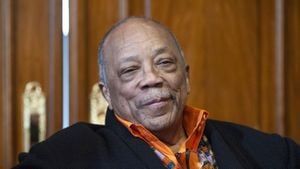Former President Donald Trump has once again made headlines as he leads the pack for the Republican presidential nomination for the 2024 election. Amidst various polls and speculations, the latest round of elections has brought unexpected results and fierce commentary from both sides of the political aisle.
Recently, Trump celebrated his victory in Iowa, clinching 56.5% of the votes against Democratic contender Kamala Harris, who managed to gather only 41.9% with 65% of the votes counted. This win gave Trump six electoral votes, bringing his total to 207, just 63 votes shy of the 270 needed to win the White House. His win marked a strong comeback in Iowa, where many believed Harris had gained momentum based on recent polls showing her edging out Trump by three points.
Interestingly, Trump's success stands as a stark reminder to analysts and pollsters alike—never underestimate the unpredictability of election outcomes. Ann Selzer, the pollster behind the predictions leading up to the Iowa elections, found herself at the receiving end of Trump's mockery. "Starting on Day 1 President Trump and Vice President JD Vance will help to ease costs, secure the border, and protect Social Security for retirees like Ann Selzer," stated Trump's campaign as they seized the opportunity to gloat over the miscalculated predictions.
Meanwhile, the political climate is buzzing with responses not just from Trump’s camp but also from his opponents. Kamala Harris's recent loss has led pundits to speculate on its ramifications for the Democratic Party's strategy moving forward. While traditionally, Iowa has leaned Republican, Harris's near victory indicated potential shifts among voters—however, Trump's decisive win displayed the challenges she faces within blue states as well.
But the election night surprises didn’t stop at Iowa. Trump also made headlines in North Carolina, where he flipped Anson County—a significant change since it's the first time this historically Democratic region has supported a Republican since the 1970s. Trump garnered 51.8% of the votes compared to Harris's 48.3%. This shift points to broader trends of changing voter demographics, particularly among rural counties, and suggests increasing challenges for Democratic candidates as they seek to secure their traditional territories.
Reactions came swiftly as Trump returned to Mar-a-Lago for celebratory remarks shortly after his apparent victories. During the early hours following the election, with media outlets still hesitating to declare him the outright winner just yet, Trump took to the stage buoyed by confidence. He referenced life-threatening attempts made against him, framing his political battles as divinely guided endeavors. “Many people have told me God spared my life for a reason. And now we are going to fulfil our mission together,” he proclaimed, jutting his chin up defiantly.
Notably, Trump praised figures such as Robert F. Kennedy, who had recently thrown his support behind the former president, and even called electric car magnate Elon Musk a “super genius.” This mix of coalition building and inspirational rhetoric is indicative of Trump’s strategy as he moves forward, painting himself not just as a competitor but as the chosen leader of the American people.
While Trump relishes his victories, the Democratic Party's reactions indicate concern over Trump’s rising momentum, especially as several key elections loom. Kamala Harris’s campaign has received scrutiny on how they plan to win back disenchanted voters, particularly after seeing losses with the polls appearing to favor her only days prior to voting.
To compound the intrigue, recent developments signal more than just electoral battles. Bomb threats targeted voting sites across key swing states, including Arizona, with officials suspecting foreign interference aimed at creating chaos rather than changing the outcome of the elections. Arizona Secretary of State Adrian Fontes commented, “We have no reason to believe any voters or polling places are in jeopardy,” attempting to quell fears as investigations continue.
On the other side of the aisle, serious reflections are taking shape. Michigan saw significant judicial shifts as Democrats flipped the Michigan Supreme Court, indicating some resilience amid expectations of Trump’s campaign. Democratic nominees Kyra Bolden and Kymberly Ann Thomas both won their judicial elections as their party capitalized on the narratives surrounding reproductive rights and other social issues gaining traction, potentially pushing Democratic strategies even as Trump looks to reclaim prominence.
Prominent commentators are closely monitoring how long-term ramifications of Trump's campaign might play out. The political atmosphere is more than just numbers—it's about narratives and how they resonate within communities across the nation.
The battle for 2024 continues as both sides prepare for the reaches of social media, the battleground states, and the potential for disruptive external influences. Even as Trump celebrates his victories, his campaign faces the hard truths of what's to come, exemplifying just how volatile the American political scene remains.
While Trump holds onto his support with fervor, the challenges presented by opponents like Harris and the Democratic Party signal difficult fights ahead, creating an electrifying prelude to what promises to be one of the most captivating presidential elections yet.



